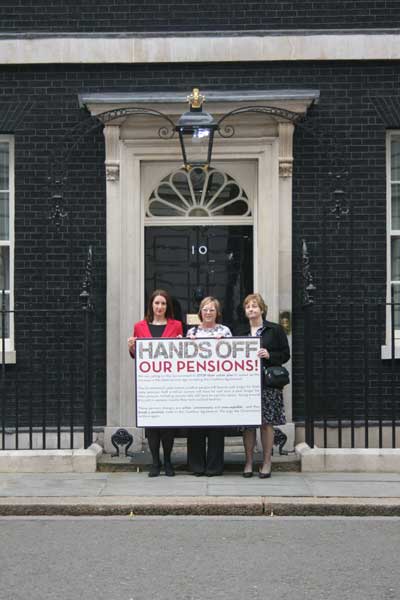Simon Read: Why should women have to lose their retirement income?

Your support helps us to tell the story
From reproductive rights to climate change to Big Tech, The Independent is on the ground when the story is developing. Whether it's investigating the financials of Elon Musk's pro-Trump PAC or producing our latest documentary, 'The A Word', which shines a light on the American women fighting for reproductive rights, we know how important it is to parse out the facts from the messaging.
At such a critical moment in US history, we need reporters on the ground. Your donation allows us to keep sending journalists to speak to both sides of the story.
The Independent is trusted by Americans across the entire political spectrum. And unlike many other quality news outlets, we choose not to lock Americans out of our reporting and analysis with paywalls. We believe quality journalism should be available to everyone, paid for by those who can afford it.
Your support makes all the difference.Women marched on Westminster this week to complain about the Government moving their pension goalposts. They had a massively important point to make. The Coalition's intention to raise the state pension age to 66 by 2020 will affect five million people and simply does not give them enough time to plan. It also risks plunging thousands of women into poverty, according to the charity Age UK, which arranged Wednesday's demonstration at Parliament.
About 2.6 million women will have to wait at least a year longer for their state pension because of the change and the plan to speed up the rate at which their state pension age is increased to 65 years, in line with men's. Among these, there are 330,000 women who will have to wait an extra 18 months to two years before they can start drawing the benefit.
Those forced to wait two years will lose an average of £10,000 of their state pension income. And it is not the first time they have been hit by politicians messing with the pensions system after the previous Labour government set in place proposals to raise the state pension age to 65 by 2020.
Age UK warned that many of the women affected by the changes are either carers or in poor health, which means working for longer is not an option for them. The shadow Pensions Minister, Rachel Reeves, said: "The Government is unfairly targeting women with this sudden rise in the state pension age, leaving them little time to plan. If these plans become law, they will leave women with little time to prepare for their retirement."
The Department for Work and Pensions was unapologetic about the proposals, and pointed out that the world has changed considerably since the state pension age was set at the beginning of the 20th century. With increased longevity, state payments have to last for longer. The proposals are logical in terms of balancing the books and ensuring the state can meet its future pension commitments, but the timing is unfair.
The Government should listen to the complaints from the disadvantaged women and revise the proposals accordingly. Arguments that the proposals will only affect women born between 1953 and 1954 are wrong-headed.
"Putting pensions on a sustainable long-term footing does not justify the sudden increase being imposed on one group of women at such short notice, especially when the Government knows that these particular women are more vulnerable than men and have little or no private pension wealth," said Ros Altmann, the director-general of Saga, the company focused on serving the needs of the over-50s.
It is unfair for any woman to lose out simply because of her birthdate. For tens of thousands to have retirement plans thrown into disarray by some thoughtless decision-making is an injustice. The Government should rethink its pension proposals.
Safeguard your future finances
there was frightening news this week about how unprepared we all are. First, Scottish Widows warned that a third of households could not cope financially should the main breadwinner lose his or her income. Yet only 7 per cent of families has an income protection policy.
The cover is relatively cheap and, while times are tough for many families, income protection could prove to be a wise investment if someone did lose their job or was unable to work through illness. However, like all insurance, it is a gamble. Me? I like to have the peace of mind of knowing that my children would not suffer financially if I was unable to work.
The second survey was from Aviva and showed that 72 per cent of people do not contribute to a workplace pension because they cannot afford to. Paying into a pension may not seem high on your priorities at the moment – especially if you are under 40 – but as you start to approach retirement, you will regret not stashing more cash away – especially if you turned down the chance of having your employer add to your pension pot on top of your contributions.
The Government's auto-enrolment scheme, which launches next year, will improve the situation but there is no need to wait until then to start saving for your retirement.
s.read@independent.co.uk
Join our commenting forum
Join thought-provoking conversations, follow other Independent readers and see their replies
Comments